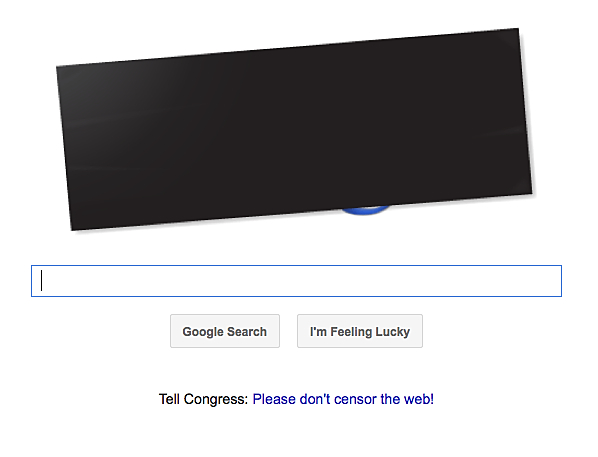[Editor's Note: You can sign Google's online petition against SOPA/PIPA here (https://www.google.com/landing/takeaction/).] By Declan McCullagh & Greg Sandoval on 17 January 2012 for CNet - (http://news.cnet.com/8301-31001_3-57360223-261/google-will-protest-sopa-using-popular-home-page/?part=rss&subj=latest-news&tag=title)
 Image above: Google blocks out its logo on webpage on 18 January 2012. From (https://www.google.com/).
Image above: Google blocks out its logo on webpage on 18 January 2012. From (https://www.google.com/).
Google, the Web's top search company and one of technology's most influential powers in Washington, will post a link on its home page tomorrow to notify users of Google's opposition to controversial antipiracy bills being debated in Congress.
The company confirmed in a statement that it will join Wikipedia, Reddit, and other influential tech firms in staging protests of varying kinds against the Stop Online Piracy Act (SOPA) and Protect IP Act (PIPA), which are backed by big entertainment and media interests. (Read a roundup of our SOPA and PIPA coverage here.)
"Like many businesses, entrepreneurs, and Web users, we oppose these bills because there are smart, targeted ways to shut down foreign rogue Web sites without asking American companies to censor the Internet," a Google representative said. "So tomorrow we will be joining many other tech companies to highlight this issue on our U.S. home page."
In response to questions about how the protest link would be displayed on the page, all Google would say is that the link would not replace the company logo.
Not everyone who opposes the legislation agrees on how best to stage a protest. None of the protests appear to take as dramatic a step as the one planned by Wikipedia. The English version of the Web encyclopedia is scheduled to go dark for 24 hours.
The past weekend will likely long be remembered as a turning point in the debate over how to fight online piracy in the United States. Supporters of SOPA and PIPA once could boast of wide bipartisan support, but the proposals suffered a series of blows starting Thursday, when the Senate leaders decided to eliminate an important provision in PIPA.
By Friday, both houses of Congress had eliminated a requirement in each bill that would have compelled U.S. Internet service providers to cut off access to foreign sites accused of piracy.
Following that, a group of Senators--some who once supported PIPA--requested that a vote on the bill be delayed. The request was denied, but things kept getting worse for antipiracy proponents. On Saturday word came that the House would delay a vote on SOPA. And then finally, the White House, considered an ally of the music and film industries, suggested in a statement that the president would not support several cornerstone provisions of the bills.
All of the news culminated in what may come to be known in the entertainment sector as Black Sunday. Rupert Murdoch, chairman of News Corp. and one of the world's preeminent media tycoons, displayed a rare public tantrum via Twitter. In his posts, he accused the president of taking his marching orders from "Silicon Valley paymasters." Murdoch suggested Google was whipping up opposition and was a "piracy leader."
Google called Murdoch's accusations "nonsense."
Whatever it was, the outburst illustrated the frustration of copyright owners. There was no hiding that the tide of the legislative battle had reversed and copyright owners were alarmed.
Nonetheless, the fight still has a long way to go.
Senate Majority Leader Harry Reid (D-Nev.) plans to go ahead with a vote on PIPA on January 24. In the meantime, the tech sector will move forward with its protests in an attempt to enlist help from the masses.
See also: Ea O Ka Aina: Internet Censorship Ahead 11/16/11 .
No comments :
Post a Comment